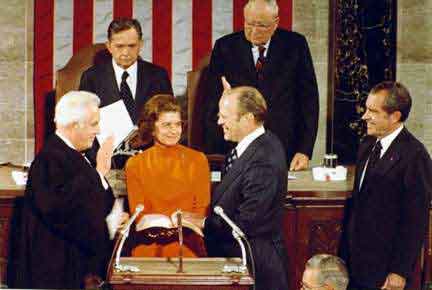In case of the removal of the President from office or of his death or resignation, the Vice President shall become President.
And that was just the start.
Before 1967 the Constitution never specified what exactly would happen if something happened to the president of the United States. For the first time on April 4, 1841, a president passed away. The nation's 9th chief magistrate, William Henry Harrison gave the longest inaugural address in the depths of winter on March 4th of that year. The oldest man elected to the office to that point (Ronald Reagan would later hold that title) decided to give his long address without a top hat or overcoat. The 68 year old president died 30 days (or 32?) later of pneumonia.

William Henry Harrison, 9th President of the United States
Hay dios mio! What do we do?
The 10th vice president of the United States, John Tyler, found out the next day that President Harrison had passed away. The Constitution said:
In Case of the Removal of the President from Office, or of his Death, Resignation, or Inability to discharge the Powers and Duties of the said Office, the same shall devolve on the Vice President
What did devolve mean? It was unclear and the Founding Fathers made it unclear intentionally or unintentionally. But Vice President Tyler took it to mean that he would become the president of the United States.

John Tyler, 10th Vice President of the United States and 10th President of the United States
On April 6th he took the oath of office and the reigns of power. The cabinet, which Harrison appointed, tried to deny Tyler the authority of the presidency. Tyler made it clear to them and his detractors in the Congress that he was the president of the United States, not Acting-President or the Vice President in the role of the presidency until some kind of special election.
The 10th vice president went on to become the 10th president.

Vice President Tyler being informed of the death of President Harrison
The Tyler Precedent would be followed by Millard Fillmore, Andrew Johnson, Chester Arthur, Theodore Roosevelt, Calvin Coolidge, Harry Truman, and Lyndon Johnson. The Tyler Precedent would go on to be written into the Constitution as the 25th Amendment. Gerald Ford would be the first to be elevated thanks to the 25th Amendment. Ford would also be the first to be appointed vice president due to a vacancy.

House Minority Leader Gerald Ford being sworn in as the 40th Vice President of the United States
The 25th Amendment would also make sure that there would never be a vacancy in the vice presidency. Whenever the vice presidents succeeded to the presidency, died in office, or resigned leaving the vice presidency vacant it would remain so until the next election and then inauguration.
The acknowledgment that the vice president becomes the president is the first thing mentioned in the 25th Amendment and has taken effect only by Gerald Ford's ascendancy. Filling the vacancy is the second part of the Amendment which has only occurred twice, Ford replacing Spiro Agnew after his resignation in 1973 and Nelson Rockefeller's appointment once Ford succeeded President Nixon in 1974. The third section of the Amendment allows the president to inform the President Pro Tempore and the Speaker of the House that he or she cannot perform the duties of the office and transmit the powers to the Vice President to perform them as Acting President and can reclaim the powers once he or she informs the two leaders of the Congress. Ronald Reagan did this in 1985, making Vice President George Herbert Walker Bush the first Acting-Presidnet. While Dick Cheney held the title twice during the George W. Bush administration once in 2002 and then again in 2007.
The final section of the 25th Amendment has never taken place. George H. W. Bush calls the fourth section a legal coup. The vice president and a majority of the cabinet officers are needed to declare the president unable to execute the duties of the office. The closest we've come to this is in the feature film Air Force One when the vice president played by Glenn Close is presented with a letter readied for her to sign initiating the Acting President status under the fourth section of the 25th Amendment. She tears it up at the end of the film once the president is safe from the Russian terrorists and no longer in danger.

Air Force One movie poster
It took the threat of a nuclear age for the line of succession of vice president to president to be clearly written into the Constitution. After the assassination of John F. Kennedy in 1963, the vice presidency remained vacant. Where as before then no evil or dangerous threat really harmed or threatened the country as succession slowly took its time. But in the post-Cuban Missile Crisis United States immediate succession took precedent.
No comments:
Post a Comment